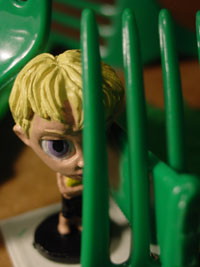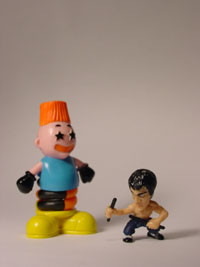
February 27, 2010, by Peter Kirwan
Romeo and Juliet (Tiny Ninja Theater) @ Tara Studio
Writing about web page http://www.tinyninjatheater.com/romeoandjuliet/
Dov Weinstein’s classical theatre troupe, the Tiny Ninja Theater, returned to the UK for two performances only with this, Romeo and Juliet, performed as part of the Tara Arts “Shakespeare Remixed” season. As ever, the defining characteristics of the company shone through – powerful performances, elaborate sets and an accessible approach to Shakespeare’s text.
The two young lovers, played by Chris Head and Melanie Hipchikz, brought an innocence to their roles that heightened the pathos of the tragedy, yet at the same time embraced the humour of youthful love. Head’s sighing and moaning over the lost Rosaline, whose name he paused longingly over as he read Peter’s letter, demonstrated his infatuation to be more akin to the self-indulgent sonneteering of the period rather than anything approaching a genuine affection. Yet, with his big eyes and earnest manner, one couldn’t help but invest in his commitment to Juliet. As they met at Capulet’s ball (a lavish shoe-box set with mirrorballs, dancefloor and a whole host of guests), the lights faded and illuminated their first meeting, setting it above and beyond any previously-held affections.
The balcony scene, this time in an upright shoebox, saw a garden amusingly created out of green plastic kitchen utensils, among which Romeo hid as he awaited Juliet. Hipchikz performed from the top of the shoebox, behind a lid with an orange screen that evoked the East from which she “arose”. Unsure and nervous, Juliet remained coy behind the orange screen, except for when her excitement drove her to thrust her head out of the window and address Romeo face to face. The comedy drawn from this scene extended to Romeo’s unusually hasty departure, leading Juliet to have to roar for his return in order to confirm the details of their meeting.
Mrs. Smile and Jeffery Smile (so powerful as Claudius and Gertrude in the company’s previous Hamlet ) adequately supported the debutants in the key roles of the Nurse and Friar Laurence, the two least-cut of the lesser roles. Mrs. Smile in particular played up the entertaining aspects of the character, revelling in her shrill off-stage cries and deliberately annoying interruptions. In the streets, her tightly-wound red headdress was unwrapped to spread across much of the tiny stage, and she was accompanied by Alien Fighter’s Peter, a living fan who spread her headdress like a sail, prompting Mercutio’s taunts. Friar Laurence’s cell, meanwhile, was constructed from a first aid kit under a blue light, a barren environment in which he dispensed advice and comfort.
Prince Escalus was played by Ninja with a comic lisp, particularly hysterical as he spoke of the woe of “Juliet and her Womeo” in the play’s closing moments. Situated on a baseball cap worn by director Weinstein, along with his retinue, he addressed the brawling Montagues and Capulets from a position of authority (literally, from Weinstein’s head), condemning with unquestionable command despite the amusement occasioned by his accent. More obviously comic was Trevor Bigfoot’s Mercutio. The clown, drafted in presumably to emphasise these aspects of the character, utilised his natural comic skill in delivering Mercutio’s lines, although cutting of his earlier scenes (including the Queen Mab speech) meant he only his scenes with the Nurse and then Tybalt to make an impact. Despite this, Bigfoot stole the show in his brief scenes. His battle with Brice Leigh’s Tybalt was disturbingly short and abrupt: Leigh, positioned on a magnetic cane wielded by Weinstein, thrust home quickly and sharply, leaving the clown unravelled and still on the stage, spluttering out his final curses. Romeo barely paused before striking down Tybalt and fleeing. The brutal and bloody action happened in mere seconds, cutting straight through the comic atmosphere that had characterised the scene’s beginning.

I was struck by an unusually sympathetic Paris, played by the diminutive Ninja, a mere child next to Capulet (Ninja) and Lady Capulet (Ninja). Particularly as they duelled in the graveyard, a guitar case strewn with tiny headstones, Paris’s relative weakness and dedication made his demise somewhat poignant. All the characters in this production, however, were subject to fate, as made clear in the chilling appearance of the skeletal Mr. Bones as the Apothecary. Ascending from a closed pot with a slow gravity, and speaking in hushed tones, his gift of the vial to Romeo struck an ominous note unmatched in previous productions. The black comedy of Romeo’s instruction that the skeleton use the money for food only heightened the sense of impending doom.
As the play’s conclusion drew closer, death literally seemed to press in on the lovers. Juliet’s sleeping body was entombed in a jewellery case, her body being literally figured as precious dead metal. Similarly, the move to the enclosed space of the guitar case saw the pair physically enclosed, with nowhere left to run. In a powerful moment here, however, Weinstein himself performed their dying moments. We moved from his Romeo, holding up the lifeless Juliet and gulping down the apothecary’s potion, to his Juliet, waking up to hold a vial with the drowned Romeo floating inside it, and stabbing herself. Weinstein brought a real pathos to these closing moments, made all the more powerful for being performed by a human rather than toys, in stark contrast to the previous forty minutes.
Despite a dramatic calamity halfway through the show, when a power cut brought the performance to a halt and Weinstein was forced to spend ten minutes recreating the necessary conditions of performance (for of course, as good as they are, his actors are not the most adaptable to external difficulties), this was a hysterical and often surprisingly moving production. Weinstein’s one-man show (which I’ve reviewed in the spirit it’s presented!) would have been a wonderful introduction to Shakespeare for newcomers, but even for experience theatregoers, his intelligent cutting drilled down to the emotional heart of the play, and the inherently comic approach only served to accentuate a sense of genuine pity at the production’s close. Innovative, highly-skilled and endlessly creative, and a thoroughly entertaining afternoon.
No comments yet, fill out a comment to be the first

Leave a Reply